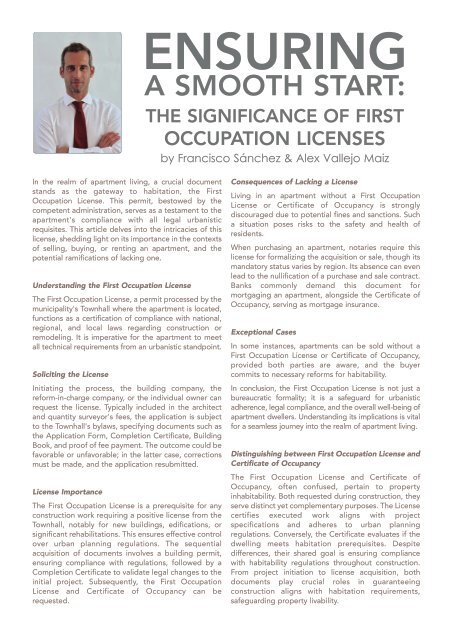Nevado Spring Summer 24
Create successful ePaper yourself
Turn your PDF publications into a flip-book with our unique Google optimized e-Paper software.
PAG 02 a 13 ADS 59.qxp_Layout 1 19/3/<strong>24</strong> 13:37 Página 10<br />
ENSURING<br />
A SMOOTH START:<br />
THE SIGNIFICANCE OF FIRST<br />
OCCUPATION LICENSES<br />
by Francisco Sánchez & Alex Vallejo Maiz<br />
In the realm of apartment living, a crucial document<br />
stands as the gateway to habitation, the First<br />
Occupation License. This permit, bestowed by the<br />
competent administration, serves as a testament to the<br />
apartment's compliance with all legal urbanistic<br />
requisites. This article delves into the intricacies of this<br />
license, shedding light on its importance in the contexts<br />
of selling, buying, or renting an apartment, and the<br />
potential ramifications of lacking one.<br />
Understanding the First Occupation License<br />
The First Occupation License, a permit processed by the<br />
municipality's Townhall where the apartment is located,<br />
functions as a certification of compliance with national,<br />
regional, and local laws regarding construction or<br />
remodeling. It is imperative for the apartment to meet<br />
all technical requirements from an urbanistic standpoint.<br />
Soliciting the License<br />
Initiating the process, the building company, the<br />
reform-in-charge company, or the individual owner can<br />
request the license. Typically included in the architect<br />
and quantity surveyor's fees, the application is subject<br />
to the Townhall's bylaws, specifying documents such as<br />
the Application Form, Completion Certificate, Building<br />
Book, and proof of fee payment. The outcome could be<br />
favorable or unfavorable; in the latter case, corrections<br />
must be made, and the application resubmitted.<br />
License Importance<br />
The First Occupation License is a prerequisite for any<br />
construction work requiring a positive license from the<br />
Townhall, notably for new buildings, edifications, or<br />
significant rehabilitations. This ensures effective control<br />
over urban planning regulations. The sequential<br />
acquisition of documents involves a building permit,<br />
ensuring compliance with regulations, followed by a<br />
Completion Certificate to validate legal changes to the<br />
initial project. Subsequently, the First Occupation<br />
License and Certificate of Occupancy can be<br />
requested.<br />
Consequences of Lacking a License<br />
Living in an apartment without a First Occupation<br />
License or Certificate of Occupancy is strongly<br />
discouraged due to potential fines and sanctions. Such<br />
a situation poses risks to the safety and health of<br />
residents.<br />
When purchasing an apartment, notaries require this<br />
license for formalizing the acquisition or sale, though its<br />
mandatory status varies by region. Its absence can even<br />
lead to the nullification of a purchase and sale contract.<br />
Banks commonly demand this document for<br />
mortgaging an apartment, alongside the Certificate of<br />
Occupancy, serving as mortgage insurance.<br />
Exceptional Cases<br />
In some instances, apartments can be sold without a<br />
First Occupation License or Certificate of Occupancy,<br />
provided both parties are aware, and the buyer<br />
commits to necessary reforms for habitability.<br />
In conclusion, the First Occupation License is not just a<br />
bureaucratic formality; it is a safeguard for urbanistic<br />
adherence, legal compliance, and the overall well-being of<br />
apartment dwellers. Understanding its implications is vital<br />
for a seamless journey into the realm of apartment living.<br />
Distinguishing between First Occupation License and<br />
Certificate of Occupancy<br />
The First Occupation License and Certificate of<br />
Occupancy, often confused, pertain to property<br />
inhabitability. Both requested during construction, they<br />
serve distinct yet complementary purposes. The License<br />
certifies executed work aligns with project<br />
specifications and adheres to urban planning<br />
regulations. Conversely, the Certificate evaluates if the<br />
dwelling meets habitation prerequisites. Despite<br />
differences, their shared goal is ensuring compliance<br />
with habitability regulations throughout construction.<br />
From project initiation to license acquisition, both<br />
documents play crucial roles in guaranteeing<br />
construction aligns with habitation requirements,<br />
safeguarding property livability.















